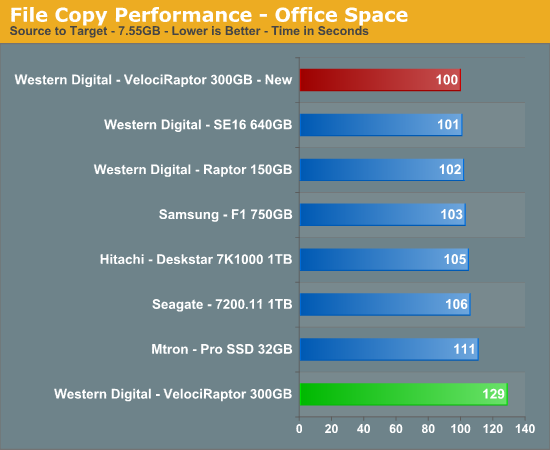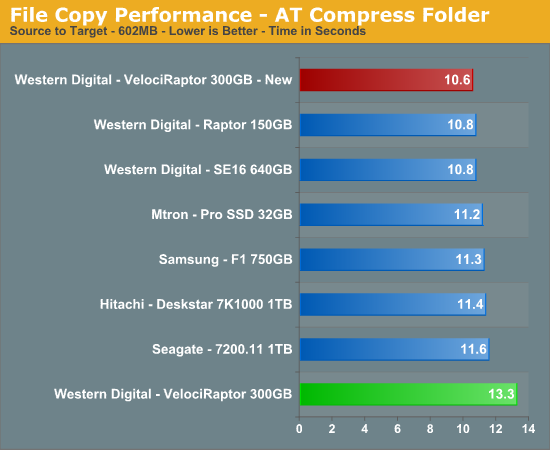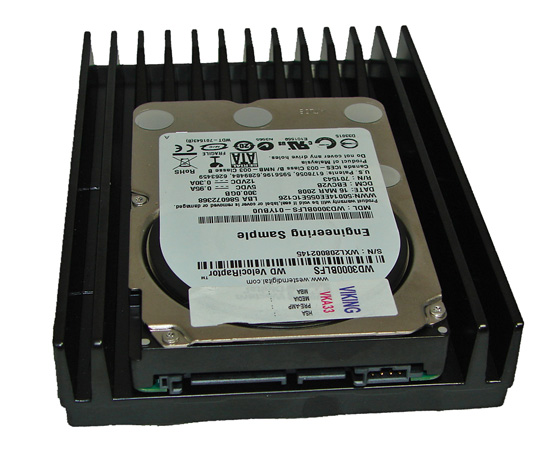Western Digital VelociRaptor: A Drive with a Bite
by Gary Key on April 22, 2008 4:00 AM EST- Posted in
- Storage
File Copy Performance
Our file copy test measures the time it takes to transfer our first test folder that contains 29 files, 1 folder, and has 7.55GB of data from our source drive to the target test drive. The second test folder contains 444 files, 10 folders, and 602MB of data. These benchmarks are disk write intensive and require a fast storage system.


We finish our application tests with benchmarks that should favor the Raptor family because it represents a pure write scenario where speed kills. In this case, our VelociRaptor got its talons handed to it. We ran these tests repeatedly with the same results for the most part. The sustained write performance of the VelociRaptor was continually hampered by the slowdown/speedup write operations on the outer tracks.

First Thoughts
We are actually not going to come to any conclusions yet on what appears to be a very impressive piece of engineering work from Western Digital. The VelociRaptor VR150 is indeed a huge leap in design - and in certain cases, performance - over the original Raptor. While the two drives share a common 10k RPM design, everything else about the drives, sans the warranty and black paint, is different.
Sometimes changing too much leads to disaster, but in this case, we are glad that Western Digital burned the Raptor blueprints and started over. The 2.5" form factor, low power consumption, and excellent acoustics will be appreciated in the enterprise market where saving money on energy and storage footprints are extremely important now, or should be. In a nod to the enthusiast sector that made the original Raptors kings of desktop performance, Western Digital did not leave us out in the cold, but instead provided the IcePAK chassis for our 3.5" form factor case requirements.
Our only problem at this point is that we could not complete our review. The early firmware problems caused havoc in our application benchmarks, so much so that we left out several results, as we knew the drive should perform better. Our comparisons against entry-level SAS drives suffered the same fate. Yes, the drive was extremely fast in IOMeter and other tests we ran, but we did not trust the results at this point. We expect new firmware and a new drive shortly and will finish our review at that time. Until then, this is one dinosaur we would not want to mess with.










31 Comments
View All Comments
AnnihilatorX - Tuesday, April 22, 2008 - link
I'd think real performance matters more than spec.I doubt on a fast spin drive 32MB cache would perform any better than 16MB cache, looking at the burst transfer rate of 110MB/s.
rudy - Tuesday, April 22, 2008 - link
What about the fact you pay 300$ for it? For that I would say 32mb should be given if it does not hurt performance.GhandiInstinct - Tuesday, April 22, 2008 - link
rudy,my logic exactly!
Razzbut - Tuesday, April 22, 2008 - link
My question is - will it be quicker than 2x decent SATA IIs running in RAID 0?Focus here is price per performance of course, and capacity to boot!
AaronV - Wednesday, April 23, 2008 - link
Exactly! I would also like to see this compared to MTRON's 3000 series of SSDs (the cheapest of which can be found for $369).Hulk - Tuesday, April 22, 2008 - link
Once the bugs get worked out of this one it looks like it will be a tremendous performer.And I have a feeling WDC knows that IT will be the drive that future SS drives will be compared so this will make it tougher for SS drives to look good in such comparisions. WDC is smart to push this technology now even though at this point SS drives aren't really viable competition. The storm is coming and they are not sitting around twiddling their thumbs.
bobsonthegreat - Tuesday, April 22, 2008 - link
Surely it's only the real-world stuff that matters isn't it? Is this drive really that big a leap forward because you can load a game level half a second quicker? I'm not being pedantic, I'm just wondering when we'll see real gains in HDD performance. I always thought SSD drives would change the world but they're not really that much faster are they? Not REALLY.Ryan Norton - Tuesday, April 22, 2008 - link
I'm not happy to read that removing the Icepak hoopdyhoo voids your warranty. I use elastic suspension for the HDs in my Lian Li case so 2.5" form factor drives are actually better for me, and I would definitely consider getting one of these to replace my single 74GB Raptor if I could get one of the enterprise versions (or a retail one where I could remove the stupid "heat sink" without voiding a warranty).OldWorlder - Tuesday, April 22, 2008 - link
Just take any ordinaray 1TB Drive and store data on disk duplicated redundantly with 180 degree distance. Would result in 500GB with super-fast access. I would only need < 100GB that are really fast, so do it only with the outermost 200GB Area.Maybe add bigger write-cache or small flash backup for tags of sectors that are not yet duplicated from the last write.
Please, manufacturers, please!
retrospooty - Tuesday, April 22, 2008 - link
Or you could just partition your current drive and not use the secondary partition... Perf increase is monimal, not huge.